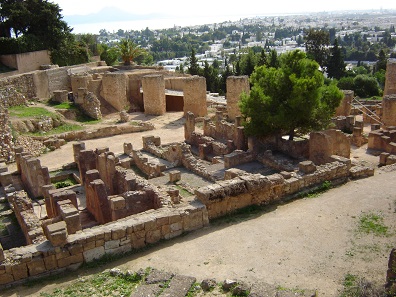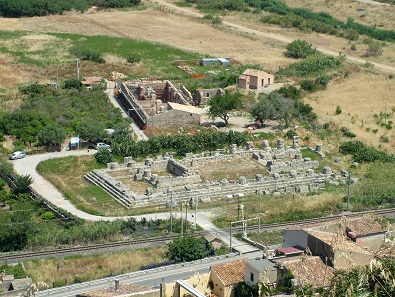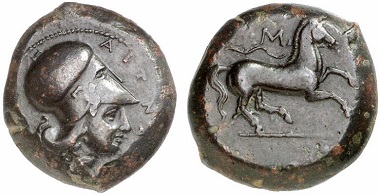translated by Sylvia Karges
In the previous three parts of this series we watched Gelon, the tyrant of Gela, conquer large parts of western Sicily; coins stemming from Gela and Syracuse illustrated that. This part will examine how the fear of Gelon brought the Carthaginians into play.
The tyrant of Himera, Terillus, felt threatened by the enormous power of Gelon, the master of Gela and Syracuse. He had established his own realm of power in the west, based, on the one hand, on his father-in-law Anaxilas, who, through the cities of Messina and Rhegion, controlled the straits, and, on the other hand, on his Carthaginian guest Hamilcar. It was through him, he was able to persuade Carthage to intervene in Sicily.
Few ruins on the hill Bysra are witnesses to the former powerful Carthage. Photograph: Wikicommons.
Greeks and Carthaginians
Greek historiography already believed to conclude from this battle traditional enmity, which made a fight between the civilized Greeks and the Carthaginian barbarians inevitable. Many scholars, especially in the 19th century, followed this historical perception, when in fact, until then, the Phoenician daughter cities lived in peace with newly founded Greek cities. Archaeological finds prove a flourishing trade. It probably was Gelon’s obvious expansionism that made the neighboring Phoenicians feel slightly uneasy.
Himera, the Victoria Temple seen from the Antiquarium. Photograph: Wikipedia / Clemensfranz.
Carthage put in its place
Carthage answered Terillus’ call for help and sent an enormous army under the command of Hamilcar, the top civil servant of the city of Carthage, to Sicily. Anti-barbaric Greek tradition has the decisive battle between Carthaginians and Syracusans under the command of Gelon at Himera in the year of 480 B.C. take place on the same day the Greeks defeated the Persians.
It was a rewarding victory for the Greeks: the leader of the enemy and the majority of the enemy army were killed, many prisoners were sold as slaves, and Carthage had to pay huge sums in reparation, which allowed Gelon to strongly increase his coin production. Gelon had built up his position of power and his reputation as the protagonist of the Greek cause.
Hieron’s court of muses
After his death, his brother Hieron took over as ruler of Syracuse from 478/7-467/7 B.C. Under his rule the city was a court of muses, where the most important Greek poets gathered.
What Pindar looked like, we don’t know. This Roman copy of a bust from the mid 5th century speaks about the high reputation, the poet enjoyed all through antiquity. Photograph: Stas Kozlovsky / https://creativecommons.org/licenses/by-sa/3.0/deed/de
The most famous among them was Pindar, who dedicated many odes to the prince, among them also the ones celebrating the victory of the princely chariot in Olympia. Even Aischylos was supposed to have stayed at Hieron’s court.
Aitna. Tetras, 354/3-344. From Gorny & Mosch Auction 208 (2012), 1085.
Expulsions – the dark side of the tyrants
The other side of the tyrants was less shiny, but more so pragmatic and therefore cruel: Although Gelon had already demonstrated how a tyrant deals with human fates when resettling half the population of Gela to Syracuse, Hieron would perfect this practice. He resettled the entire population of Naxos and Catane to Leontinoi and summoned settlers from the Greek mainland and his own city of Syracuse, who were assigned to the former city of Catane in order for him to receive eternal veneration as Heros Ktistes (= founding hero) of the city of Aitna. Despotically, power hungry rulers at this time allocated enormous masses of people from one area to the other. Their property and possessions were redistributed. Changes of power brought parts of the displaced population back to their ancestral homes. Because of these continued displacements ownership structures in Sicily became more and more unclear. Therefore, as the saying goes, it is considered here, where the art of rhetoric developed – based on the practical task to present the strongest arguments for ones property before court. Even Cicero passed on, that this was the only reason books about rhetoric were written. But with this, we’ve already rushed on to the age of archaic times.
Next, read about how the Greeks freed themselves of the tyrants and gave themselves a democratic constitution.
This article was originally published in MünzenRevue 3/1997.
Please find all parts of this series in our archive.
If you are interested in Sicily, you should certainly check out the numismatic diary “Sicily in full bloom”. Find this series also in our archives.







